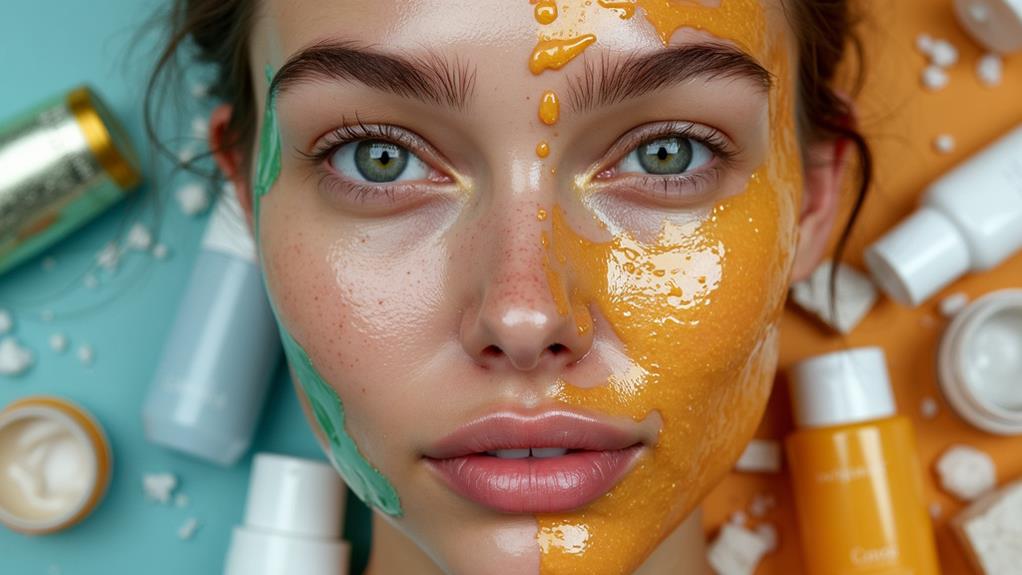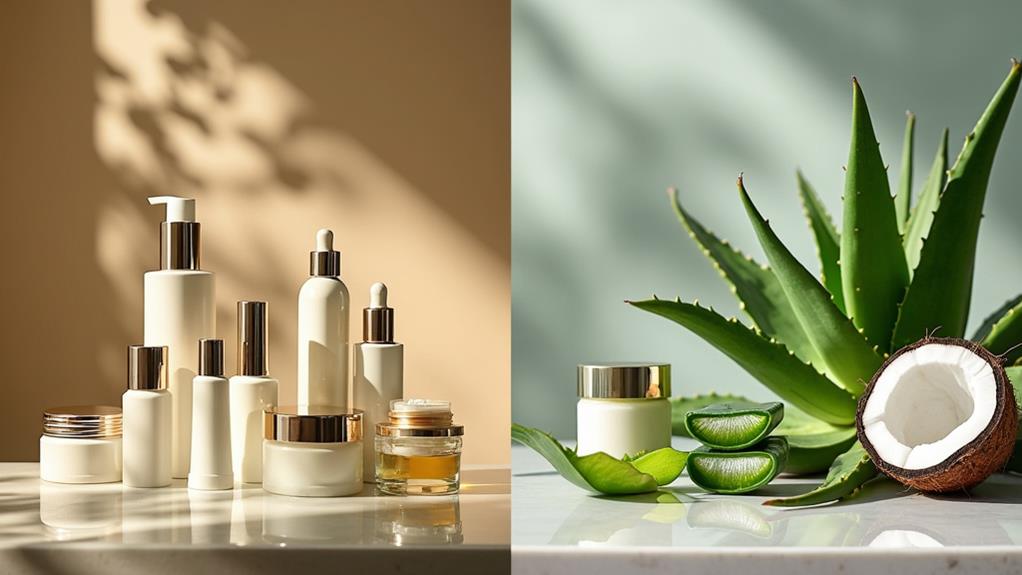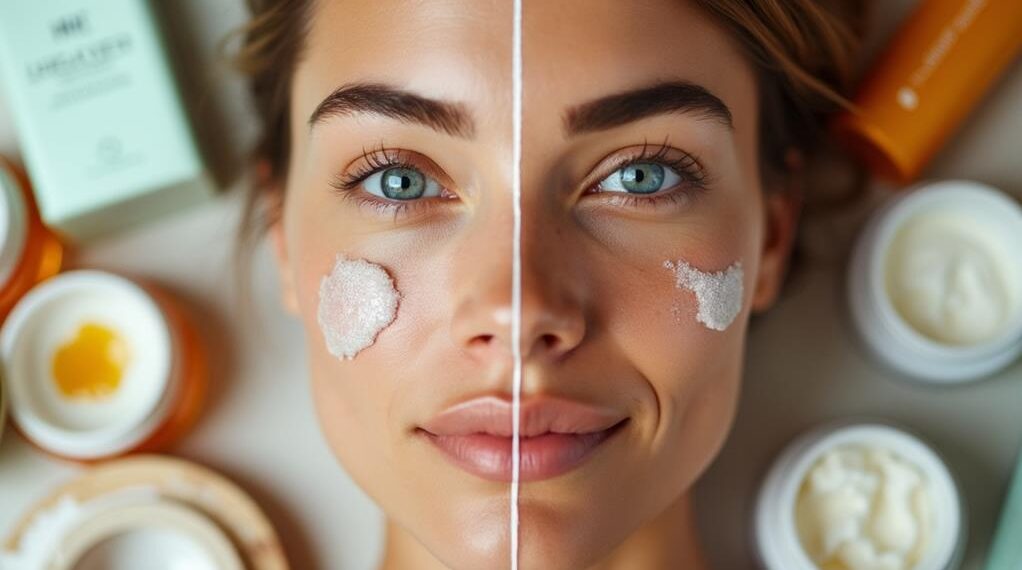You might think you know the ins and outs of skincare, but there are some common myths that could be doing more harm than good to your skin. For example, you may believe that oily skin doesn’t need moisturizer, or that natural ingredients are always safe. These misconceptions can lead to unexpected issues that undermine your skincare efforts. Understanding the truth behind these myths is essential, especially when it comes to making informed choices for your skin. Curious to find out which myths could be affecting your routine?
Myth: Oily Skin Doesn’t Need Moisturizer

Many people believe that if their skin is oily, it doesn’t require moisturizer. However, this misconception can lead to imbalances in your skin’s health. Even oily skin needs hydration, and skipping moisturizer can exacerbate oil production. When your skin lacks moisture, it compensates by producing even more oil, creating a cycle that can lead to breakouts and enlarged pores.
Moisturizer benefits extend to all skin types, including oily skin. Choosing a lightweight, non-comedogenic moisturizer can help maintain your skin’s hydration without clogging pores. Ingredients like hyaluronic acid and glycerin are excellent for oily skin, as they provide hydration without adding excess oil.
Additionally, using a moisturizer can help strengthen your skin’s barrier, protecting it from environmental stressors and reducing irritation.
Incorporating a suitable moisturizer into your routine can regulate oil production, leaving your skin balanced and healthy. Remember, hydrated skin is happy skin, and by moisturizing, you can achieve a clearer complexion.
Don’t fall for the myth that oily skin doesn’t need moisturizer; embrace hydration for ideal skin health.
Myth: Natural Ingredients Are Always Safe
Just because an ingredient is labeled as “natural” doesn’t mean it’s safe for everyone. Many people assume that natural ingredients are always gentle and beneficial, but that’s not always the case.
In fact, some natural substances can trigger skin allergies or cause irritation, especially for those with sensitive skin.
Consider these points when evaluating natural ingredients in your skincare:
- Plant Extracts: While beneficial for many, some can cause allergic reactions.
- Essential Oils: These are potent and can irritate the skin if not diluted properly.
- Fruit Acids: Natural exfoliants like alpha-hydroxy acids can be too harsh for sensitive skin types.
- Herbal Ingredients: Some herbs may have medicinal properties but can also lead to adverse reactions.
It’s essential to patch-test any product containing natural ingredients before fully incorporating it into your routine.
Remember, just because something is derived from nature doesn’t mean it’s universally safe. Always listen to your skin and consult with a dermatologist if you’re unsure about specific ingredients.
Prioritizing safety is key to maintaining healthy skin.
Myth: You Can Skip Sunscreen on Cloudy Days

Although it may seem tempting to skip sunscreen on cloudy days, harmful UV rays can still penetrate through the clouds and damage your skin. In fact, up to 80% of UV rays can reach you even when the sun isn’t shining. This means you’re still at risk for UV exposure, which can lead to skin damage over time, including premature aging and an increased risk of skin cancer.
Many people believe that if they can’t see the sun, they don’t need to apply sunscreen. However, UV radiation isn’t only present on sunny days; it can also reflect off surfaces like water, sand, and concrete, intensifying its effects.
Even if you’re indoors, UV rays can filter through windows, exposing your skin to potential harm.
To protect yourself, make sunscreen a non-negotiable part of your daily routine, regardless of the weather. Choose a broad-spectrum sunscreen with at least SPF 30 and reapply every two hours or after sweating or swimming.
Myth: Exfoliating Daily Is Beneficial
Exfoliating daily may seem like a great way to achieve smooth, glowing skin, but it’s actually a myth that can lead to more harm than good.
Over-exfoliation disrupts your skin barrier, which serves as your skin’s first line of defense against environmental stressors. When you overdo it, you can cause irritation, redness, and even breakouts.
Instead of daily exfoliation, consider these points:
- Skin Barrier Damage: Frequent exfoliation strips away natural oils, weakening the skin barrier.
- Increased Sensitivity: Over-exfoliating can make your skin more sensitive to products and external irritants.
- Impaired Healing: A compromised skin barrier can delay the skin’s natural healing processes.
- Diminished Results: Your skin may stop responding positively to exfoliation, leading to dullness and uneven texture.
For most skin types, exfoliating 1-3 times a week is sufficient.
This way, you can remove dead skin cells while allowing your skin to recover and maintain its protective barrier.
Prioritize healthy practices over aggressive routines to keep your skin looking its best.
Myth: Expensive Products Guarantee Better Results

The allure of expensive skincare products often leads many to believe that higher prices guarantee superior results. However, this notion is rooted more in value perception than in actual ingredient efficacy. Just because a product has a hefty price tag doesn’t mean it contains superior or more effective ingredients.
Many affordable brands offer formulations that rival their luxury counterparts, focusing on scientifically backed ingredients that deliver real results.
Research shows that consumers frequently equate price with quality, but that’s not always the case. It’s important to scrutinize the ingredient list rather than just the label. Active ingredients like hyaluronic acid, retinol, or vitamin C can be found in both budget and high-end products, often with similar concentrations and benefits.
Furthermore, marketing strategies can lead to inflated prices, which don’t reflect an actual increase in effectiveness. Remember, the most effective skincare routine is one that suits your unique skin type and concerns, regardless of cost.
Before splurging on that expensive cream, consider the ingredients, read reviews, and prioritize products that have a proven track record of efficacy instead of relying solely on price as an indicator of quality.
Conclusion
By debunking these common skincare myths, you can steer clear of pitfalls that could jeopardize your skin’s health. Think of your skin as a delicate ecosystem; nurturing it with accurate knowledge is essential. Just as you wouldn’t trust a fictional tale over a well-researched fact, don’t let misleading beliefs guide your skincare routine. Equip yourself with the truth, and watch your skin thrive like a garden flourishing in the sunlight of understanding.










